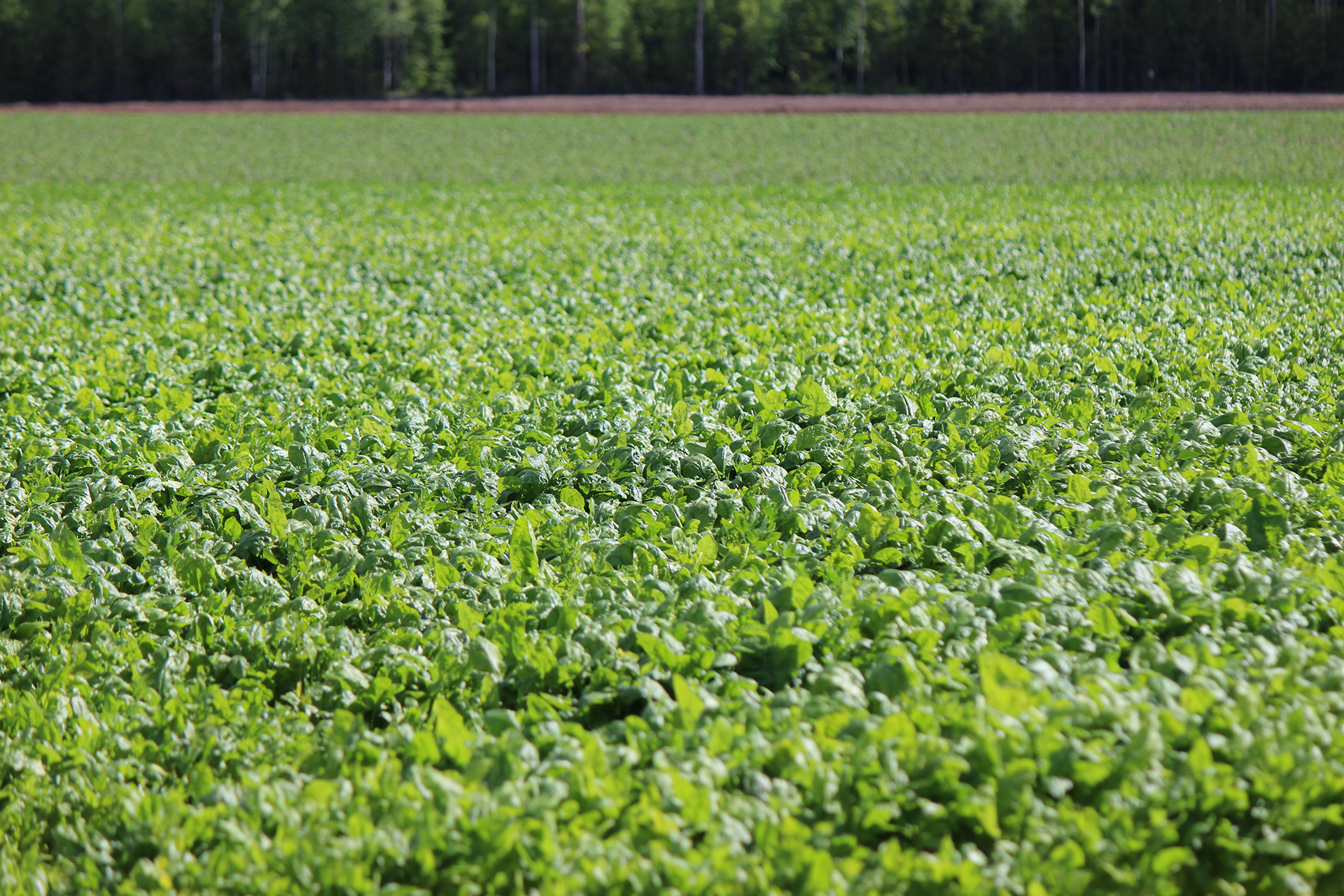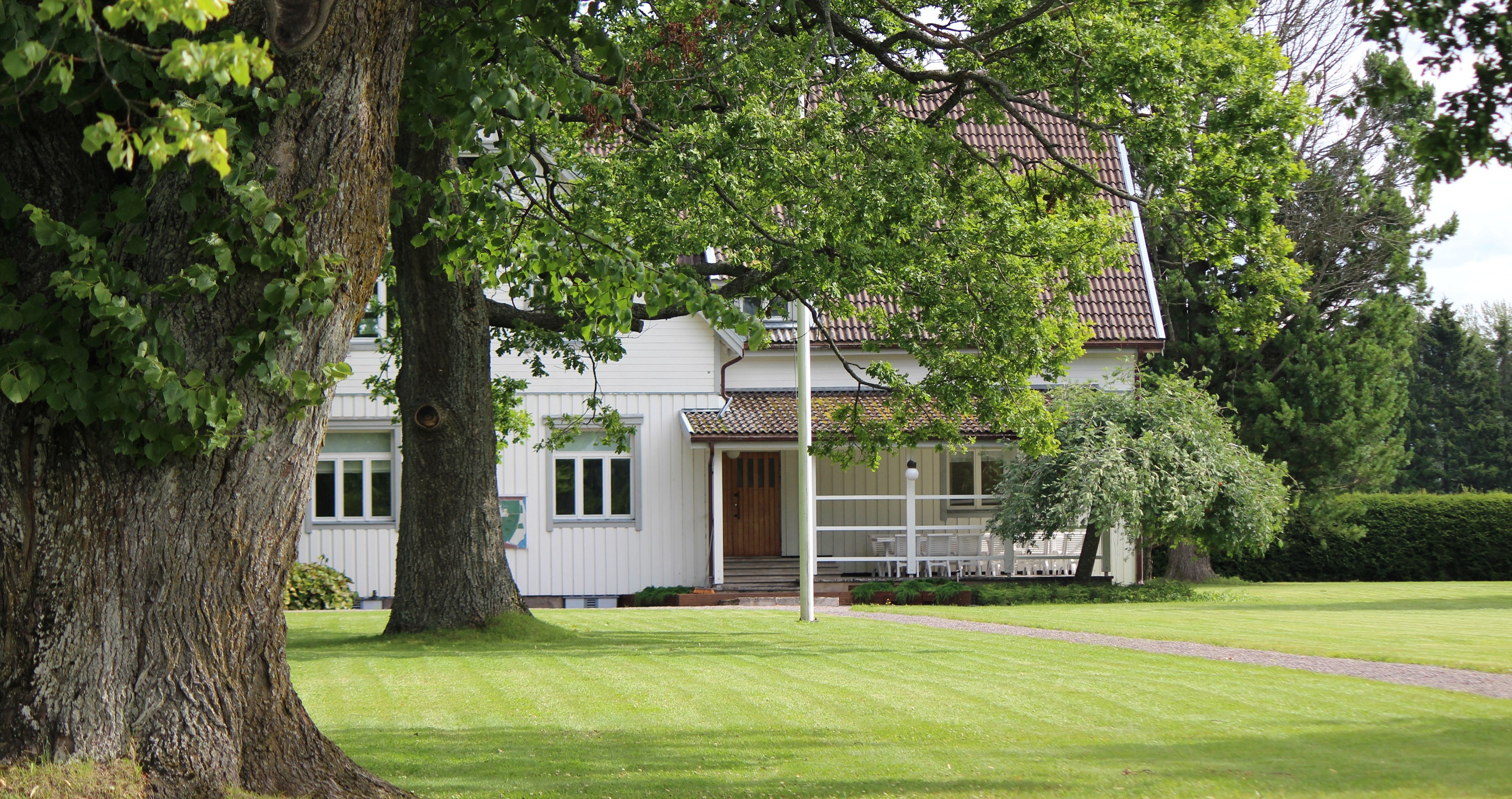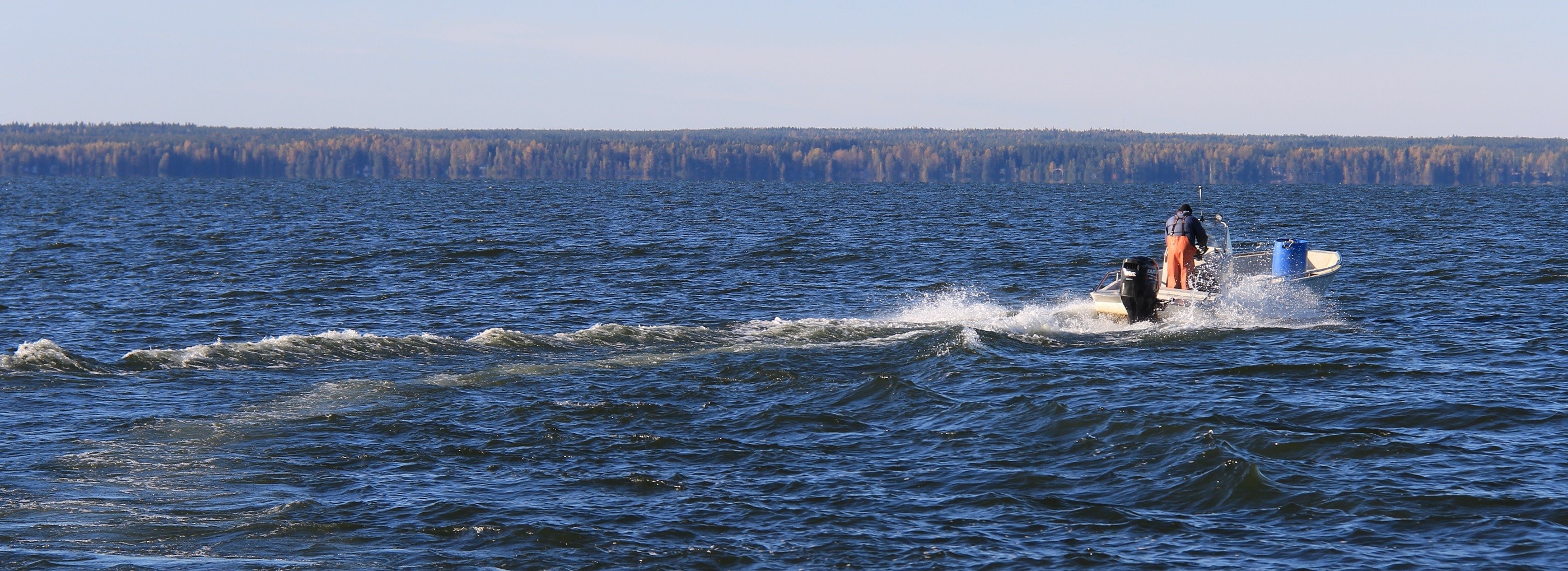Environment

Apetit to eliminate bottlenecks in the organic food sector – launching an ...
The consumer demand for organic food is increasing rapidly.* However, there is a shortage of raw material supply: in spite of the growing market, half of Finnish farmers are not interested in moving into organic farming. This is revealed by the organic farming survey commissioned by Apetit. As a food company specialising in vegetables, Apetit believes in growth of the organic food sector and takes a strategic step by establishing a development programme for organic farming. With its programme, Apetit aims to develop organic farming methods in order to facilitate farmers’ changeover to organic farming and consequently to take organic farming to a whole new level. To develop organic farming, Apetit’s Räpi experimental farm in Köyliö begins to study and develop organic farming as part of Apetit’s proprietary Vastuuviljely (Responsible farming) method. Some of the fields of the experimental farm are turned into fields supporting organic farming. Practical farming problems as obstacles to the organic leap The survey commissioned by Apetit in August 2017 revealed that farmers’ general interest in organic farming has increased from the previous year. Nearly one in four of the farmers responding to Apetit’s survey is interested in moving into organic farming. Nevertheless, for a farmer it is a question of livelihood and often also personal investment and risk. As obstacles to starting organic farming, the farmers list concrete farming problems, such as weed management, insufficiency of know-how or laborious bureaucracy related to organic farming. The farmers also demand that food industry and commerce commit to purchasing organic raw materials and that they receive practical assistance and instructions on succeeding in organic farming. "Our development programme offers help to farmers who wish to move into or towards organic farming. The goal of the programme is to increase the efficiency of organic farming and boost the crops it yields as well as to tackle various challenges related to moving over to organic farming. With this programme, we clear the way for organic vegetables to enter stores in the form of Apetit’s products. We hope that our commitment gives farmers some security", says Anu Ora, Vice President at Apetit. Ora talked about this topic at the organic food event Luomuelintarvikepäivät on 5 October 2017. Apetit introduces to organic farming a similar contract farming model as is used in ordinary farming. Farmers commit to meeting the high quality requirements of the Vastuuviljely (Responsible farming) method in organic farming, too, and in return, they have the security that their crops will be bought in the season. The first Finnish organic frozen products to stores As the first company to do so, Apetit brought Finnish organic frozen vegetables to the stores this autumn. The very first products featuring Finnish organic vegetables were Organic Spinach and Organic Peas. In November, two new favourites will be launched: Apetit Organic Potato & Soup Vegetables and Kotimainen Organic Potato and Onion Mix. “In some areas in Finland, the demand for organic food already exceeds the supply. We believe strongly in growth of the organic food sector in Finland as well as in its export prospects. For the export potential to be realised, the entire food industry and commerce would need to commit to the productisation and sales of organic products. Promoting organic food is recorded in the Government Programme and what is needed now is concrete action. Apetit wants to be a trailblazer in this respect,” Ora says. Product information Apetit Kotimainen Organic Spinach 150 g and Apetit Kotimainen Organic Peas 200 g. The Apetit organic vegetables have been grown at the Vanhakartano organic farm in Köyliö. * In a year (July 2015–June 2016), the sales of organic food increased by 12%. During that period, the retail sales of organic products amounted to approximately EUR 250 million. (Estimate by Pro Luomu on the basis of information collected from retailer groups.) During the same period, the sales of daily consumer goods only increased by 0.3%. (Sales data from the Finnish Grocery Trade Association member companies.) Key survey results A total of 68% of the Finnish farmers who took the recent survey believe that the demand for organic food is increasing among consumers. Furthermore, 44% of them believe that organic farming will become a significant agricultural activity in the future, whereas 25% disagreed on this statement and 30% could not or did not want to express their view on this matter. Of those already involved in organic farming, 49% feel that organic farming is economically more profitable than ordinary farming. Organic food has the potential to become a significant export asset for Finland, believe 46% of Finnish farmers. A total of 48% think that organic farming is a more environmentally friendly way of operating. When questioned about obstacles to starting organic farming, 54% name the difficulty of weed management as the main obstacle, 29% feel that their own know-how is insufficient and 26% think that the bureaucracy related to organic farming is too heavy. When inquired what would facilitate the changeover to organic farming, 43% of the farmers demand that food industry and commerce commit to purchasing organic raw materials over the long term, 42% need practical assistance and 41% demand support during the transition period from ordinary farming to organic farming. When presented with the statement that organic farming is not economically sensible in Finland, 29% of the respondents agreed with the statement, 31% disagreed and 39% could not or did not want to express their view on this matter. One in four responding farmers who are already involved in organic farming believe that organic food will become a permanent trend among consumers. ** Apetit had TNS Kantar Agri conduct a survey targeted at Finnish farmers of grain, vegetable, fruit, berries and oilseeds. The survey period was 17–30 August 2017. In the analysis phase, the respondent sample was weighted so that it is representative of the Finnish farm structure in terms of the farm size and organic status. The survey’s margin of error is approximately +/-6 percentage points for the entire sample. N=247 responses.

Räpi experimental farm – a pioneer in cultivation expertise in sataku...
The operations began in 1954 as an experimental farm for Länsi-Suomen Sokeritehdas Oy and they have continued uninterrupted to the present day, with Räpi serving as an experimental farm for Lännen Tehtaat and Apetit. Today, as one of only a few company-owned experimental farms in Finland, it contributes to the development of agricultural expertise in Satakunta. Throughout its history, the Räpi experimental farm has served as a channel through which new plant varieties and cultivation methods enter the Satakunta region. The cultivation methods, plant varieties and focus areas of research have changed over the years. The experimental activities began with experiments related to sugar beet varieties and cultivation methods. They were later expanded to cover many other outdoor crops when Lännen Tehtaat began the contract growing and production of a wide range of frozen vegetables in Säkylä. The research done at Räpi is aimed at anticipating future trends in outdoor crop cultivation. For example, all the plant varieties and cultivation methods selected for use in Apetit’s contract growing are tested at Räpi before their broader implementation. This season, the farm has tested plant varieties, fertiliser use and cultivation methods for peas, swede, parsnip, carrot, spinach, celeriac, sugar beet and other crops. EXPERIMENTATION PROMOTES VEGETABLE QUALITY AND SUSTAINABLE GROWING During the past decade, the research and experimentation at Räpi has been particularly focused on developing a cultivation method that supports a sustainable and environmentally friendly farming ecosystem. The most recently-developed cultivation methods are based on using plant protection measures only when necessary and only to a limited extent. Biological and mechanical solutions are prioritised. Pest control solutions can include, for example, nets that cover crops, and information on pest life cycles and their natural enemies. Similarly, biodegradable covering materials and mechanical uprooting can be used to control weeds. THE DELICIOUS TASTE OF APETIT FROZEN VEGETABLES COMES FROM EXPERT FARMING AND SUPERIOR VARIETIES The Räpi experimental farm is constantly testing new varieties to find those with the best flavour, texture, nutritional quality and suitability for freezing for use in Apetit products. Apetit’s product development also guides choices related to plant varieties and contract growing. The popularity of Apetit Kotimainen, a product range focused on vegetables grown in Finland, supports introduction of new varieties to contract growing in Finland. A HUB FOR DEVELOPING FINNISH INTEGRATED PRODUCTION EXPERTISE The results of the research at Räpi experimental farm are used in the development of the Apetit responsible farming method to which all of Apetit’s contract growers are committed. The responsible farming method is used to manage plant-specific cultivation instructions, quality and product safety, and other factors. For example, plant protection measures are only used when necessary and with due consideration. The Räpi experimental farm plays a key role in Apetit’s Responsible Farming method. The Räpi farm has contributed significantly to development of the Finnish IP (Integrated Production) method. In 2011–2013, it participated in the Varjellen Viljelty project by updating new plant-specific cultivation instructions in response to consumer expectations and regulatory standards. The Räpi experimental farm cooperates closely with the Pyhäjärvi Institute, Natural Resources Institute Finland, Åbo Akademi University, the Sugar Beet Research Centre of Finland and growers in the Satakunta region. The new knowledge and expertise developed at Räpi is transferred to Apetit’s approximately 100 contract growers in many ways. Those include the Experimental Farm Days event, which promotes the success of agriculture as a livelihood throughout Satakunta. Experimental activities in Räpi: Pea Broad bean Carrot Swede Spinach Cauliflower Potato Sugar beet for the Sugar Beet Research Centre of Finland ROOTS ON LALLI MANOR LANDS The written history of the Räpi experimental farm began in 1156, when it was part of Lalli Manor. In 1812, the Kepola country manor was separated from Lalli Manor. More than a century later, in 1917, the Kepola country manor was split into three parts and divided between the owner’s sons. The youngest son, Albert, stayed on as landlord of one of the three parts, which was subsequently named Räpi. After the war, the family’s youngest son, Jaakko Rauanheimo, became the new landlord of the Räpi estate. He held this position until 1954, when he sold the farm to Länsi-Suomen Sokeritehdas Oy, which had been established in Säkylä in the early 1950s.

Fish cakes from roach – a sensible approach!
The development of Järvikalapihvit fish cakes stemmed from finding the right networks and the desire for diverse use of Finnish fish. This led to ecological and delicious fish cakes produced locally from fish caught in Lake Pyhäjärvi. For the time being, the product is only sold to the professional food service sector. The wishes of demanding food professionals and their customers were taken into account in developing the fish cakes. Professional kitchens place a high priority on products being suitable to a wide range of customers, and on good nutritional value. The fish cakes made with lake fish contain no lactose, gluten or soy. They contain high quantities of omega 3 fatty acids and vitamin D. Roach is a low-fat, high-protein fish. Although roach and small perch are often considered low-value fish, they were given due respect as a raw material in the development of Järvikalapihvit fish cakes. “We didn’t want to mask the characteristic flavour of these fish, so we developed a straightforward flavour that combines salt, pepper, cream and butter with the taste of the fish itself,” says Hanna Pere, Marketing Manager at Apetit Ammattilaiset. This delicious and environmentally friendly product contributes to more efficient use of Finland’s fish stocks, and offers a different seafood option for food service companies. AN ECOLOGICAL CHOICE The eutrophication of Lake Pyhäjärvi in Säkylä has long been worsened by its large populations of roach and small perch. Both species feed on plankton, which helps reduce the lake’s nutrient load. Lower levels of plankton lead to more algae growth in particular. Local fishermen have managed the fish stock of Lake Pyhäjärvi by catching lower value fish to curb eutrophication and maintain the healthy balance of the lake’s fish population. In the past, fish caught as part of fish stock management were primarily used as animal feed in the fur trade, or thrown away due to the lack of the right kind of value chain to use them as food. This changed when Järvikalaa Nam, a Pyhäjärvi Institute project focussing on the use of lake fish as food, combined the product development efforts of Apetit Ruoka Oy and Jouni Aaltonen, the entrepreneur behind the Kolvaan Kala company. The roach and small perch caught as part of fish stock management are processed into a paste that is then used to produce fish cakes at Apetit’s Säkylä production facility on the shore of Lake Pyhäjärvi.
